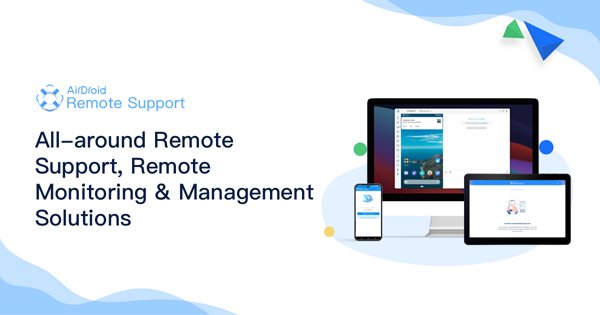10 Challenges of Working Remotely and How to Handle Them
Remote work has become more popular and common in recent years. Many people enjoy the flexibility, convenience, and autonomy of working from home. However, remote work also comes with its own set of challenges that can affect productivity, performance, and well-being. In this article, we will explore what remote work is, what the 10 most common challenges of working remotely are, and how to handle them effectively. We will also share some tips for business managers to help their remote employees overcome these issues and thrive in their work.
Part 1: What Is Remote Work?
Remote work is a work arrangement where employees perform their tasks from a location other than the office. Remote work can be done from home, a co-working space, a coffee shop, or anywhere with a reliable internet connection. Remote work can be full-time, part-time, or occasional, depending on the employer's policies and the employee's preferences.

Some of the benefits of working remotely include:
- Flexibility: Remote workers can choose their own work hours, breaks, and schedules, as long as they meet their deadlines and goals.
- Autonomy: Remote workers can work independently without constant supervision or interruptions from co-workers or managers.
- Cost savings: Remote workers can save money on commuting, parking, food, clothing, and other expenses related to working in an office.
- Environmental benefits: Remote workers can reduce their carbon footprint by avoiding transportation, office energy consumption, and paper waste.
However, there are two sides to everything. Remote working also brings some challenges to the management of the organization and the development of the employees themselves. How to deal with these challenges has become a very important issue.
Part 2: 10 Challenges of Working Remotely and How to Handle Them
Despite the advantages of working remotely, it also poses some difficulties that can hinder performance, satisfaction, and collaboration. Here are 10 challenges of working remotely and how to handle them:
1Technical Problems at Work
One of the most frustrating challenges of working remotely is dealing with technical problems, such as slow internet, software glitches, hardware failures, or cyberattacks. These problems can disrupt work, cause stress, and waste time.
How to Handle
Employees can access technical support through remote support software, such as AirDroid Remote Support. AirDroid Remote Support is a tool that allows IT technicians to access or control the mobile devices of remote workers, and they can remotely troubleshoot and solve the technical problems of remote workers. Technicians can also use AirDroid Remote Support for file transfer, live chat, and even on-screen gesture guidance to easily and conveniently solve technical problems for remote workers.

Key Features of AirDroid Remote Support
- Unattended Android Access: Under the unattended mode, you can connect and remote control a device without consent from the device end for maintenance purposes.
- AR Camera & 3D Marker: Allows you to see through the remote workers' device camera and guide remote workers by placing 3D markers onto real-world objects.
- Tutorial Gesture: Swipe or tap on the shared screen, the tutorial gesture will appear on remote workers' devices. (Only available for Android devices)
- Live Chat via Voice Call and Voice/Text Message: Tackle and resolve complex issues by communicating directly with real-time voice chat and screen viewing. If the remote worker is not available to take a call, you can communicate through voice messaging or text.
2Ineffective Time Management
Another challenge of working remotely is managing time effectively. Remote workers may need help with setting priorities, meeting deadlines, avoiding procrastination, and balancing work and personal life. They may also face distractions, such as household chores, family members, pets, or social media.

How to Handle
Employees can improve their time management skills by following these tips:
- Create a daily schedule: Remote workers should plan their workday, setting clear and realistic goals, tasks, and deadlines. They need to allocate time for breaks, meals, and personal activities.
- Use a calendar or a to-do list: Remote workers should use a calendar or a to-do list to keep track of their appointments, meetings, projects, and tasks. They should also update their status and progress regularly, using tools like Google Calendar, Trello, or Asana.
- Eliminate distractions: Remote workers should minimize distractions by finding a quiet and comfortable workspace, turning off notifications, wearing headphones, or using apps like FocusMe or Freedom to block distracting websites or apps.
- Set boundaries: Remote workers should communicate their work hours and availability to their co-workers, managers, clients, and family members. They should respect their boundaries by not working overtime, checking emails after work, or taking work calls during personal time.
3Work-Life Imbalance
A related challenge of working remotely is maintaining a healthy work-life balance. Remote workers may need help to separate work and life, especially if they work from home. They may feel isolated, overwhelmed, or burned out by working too much or too little. They may also neglect their physical, mental, or social needs.

How to Handle
Employees can achieve a better work-life balance by following these tips:
- Create a dedicated workspace: Remote workers should create a dedicated workspace that is separate from their living space. They should equip their workspace with the necessary tools, furniture, and lighting to work comfortably and efficiently.
- Establish a routine: Remote workers should establish a regular routine that helps them transition between work and life. They should stick to their work hours and breaks and avoid working outside their schedule.
- Take care of themselves: Remote workers should take care of their physical, mental, and social well-being by eating well, exercising regularly, sleeping enough, meditating, relaxing, and staying in touch with their friends and family.
4Difficulty in Team Collaboration
Another challenge of working remotely is collaborating effectively with team members, especially if they are located in different places, time zones, or cultures. Remote workers may need help with communication barriers, misunderstandings, conflicts, or lack of trust. They may also miss out on the social and emotional aspects of teamwork, such as rapport, feedback, recognition, or support.

How to Handle
Employees can enhance their team collaboration skills by following these tips:
- Use the right tools: Remote workers should use the right tools to communicate and collaborate with their team members, such as email, phone, video conferencing, instant messaging, or cloud-based platforms. They should choose the appropriate tool for the purpose, frequency, and urgency of their communication.
- Communicate clearly and respectfully: Remote workers should communicate clearly and respectfully with their team members, using simple and concise language, avoiding jargon or slang, and providing context and details. They should listen actively, ask questions, clarify doubts, and acknowledge messages.
- Build trust and rapport: Remote workers should build trust and rapport with their team members by being reliable, honest, transparent, and accountable. They should also share their personality, interests, and opinions and show appreciation, empathy, and support.
5Lack of Self-Discipline
Another challenge of working remotely is developing self-discipline. Remote workers may need more motivation, focus, or drive to work independently, with the external pressure or guidance of a boss or a co-worker. They may also need help in setting and following their standards, rules, and expectations.

How to Handle
Employees can cultivate their self-discipline by following these tips:
- Set SMART goals: Remote workers should set SMART goals, which are Specific, Measurable, Achievable, Relevant, and Time-bound. They should break down their goals into smaller and manageable tasks and monitor and evaluate their progress and results.
- Reward themselves: Remote workers should reward themselves for completing their tasks, achieving their goals, or overcoming their challenges. They should celebrate their successes and learn from their failures.
- Seek feedback and support: Remote workers should seek feedback and support from their managers, co-workers, clients, or mentors. They should be open to constructive criticism, suggestions, and advice and use them to improve their performance and skills.
6Time Zones and Cultural Differences in Teams
Another challenge of working remotely is dealing with time zones and cultural differences in teams, especially if they are working with people from different countries or regions. Remote workers may need help with scheduling meetings, coordinating tasks, or resolving conflicts. They may also encounter misunderstandings, miscommunication, or stereotypes due to different languages, values, norms, or behaviours.

How to Handle
Employees can overcome time zones and cultural differences in teams by following these tips:
- Be flexible and adaptable: Remote workers should be flexible and adaptable to the different time zones and cultures of their team members. They should also respect and accommodate their preferences, needs, and expectations and avoid imposing their own.
- Be aware and respectful: Remote workers should be aware and respectful of the different languages, values, norms, and behaviours of their team members. They should learn and appreciate their diversity and avoid making assumptions, judgments, or jokes.
- Be clear and consistent: Remote workers should be clear and consistent in their communication and collaboration with their team members. They should use common and neutral language, tone, and style, and avoid slang, idioms, or sarcasm.
7Loneliness
Another challenge of working remotely is coping with loneliness. Remote workers may feel lonely, isolated, or disconnected from their co-workers, managers, clients, or the organization. They may also miss the social and emotional benefits of working in an office, such as camaraderie, friendship, or fun.

How to Handle
Employees can combat loneliness by following these tips:
- Connect with others: Remote workers should connect with others, both professionally and personally. They should participate in virtual meetings, events, or activities with their co-workers, managers, or clients and share their work, ideas, or feedback. They should maintain their social network and reach out to their friends, family, or community.
- Join a co-working space or a club: Remote workers should join a co-working space or a club where they can meet and interact with other remote workers or people who share their interests, hobbies, or passions. They should take advantage of the facilities, services, or opportunities that these places offer.
- Seek professional help: Remote workers should seek professional help if they feel lonely, depressed, anxious, or stressed. They should also consult their doctor, therapist, or counsellor and follow their advice and treatment.
8Sedentary Lifestyle
Another challenge of working remotely is avoiding a sedentary lifestyle. Remote workers may lead a sedentary lifestyle, where they spend most of their time sitting, working, or watching screens. They may also need to pay more attention to their physical health, fitness, or hygiene.

How to Handle
Employees can avoid a sedentary lifestyle by following these tips:
- Move more: Remote workers should move more by taking regular breaks, stretching, walking, or doing some physical exercises. They should use a standing desk, a treadmill, or a fitness ball to work from different postures and positions.
- Eat well: Remote workers should eat well by choosing healthy and nutritious foods, drinking enough water, and avoiding junk food, snacks, or alcohol. They should follow a regular meal schedule and avoid eating while working or late at night.
- Maintain hygiene: Remote workers should maintain hygiene by showering, brushing, dressing, and grooming every day. They should also keep their workspace clean, organized, and ventilated.
9Limited Career Development
Another challenge of working remotely is pursuing career development. Remote workers may need more career development opportunities, such as training, mentoring, promotion, or recognition. They may also feel less visible, valued, or involved in the organization.

How to Handle
Employees can boost their career development by following these tips:
- Seek learning opportunities: Remote workers should seek learning opportunities by taking online courses, webinars, podcasts, or books to update their knowledge and skills. They should seek feedback, advice, or guidance from their managers, co-workers, or mentors and apply them to their work.
- Showcase their work: Remote workers should showcase their work by documenting their achievements, results, or impact and sharing them with their managers, co-workers, or clients. They should highlight their contributions, initiatives, or innovations and seek recognition, appreciation, or reward.
- Network with others: Remote workers should network with others by attending virtual or in-person events, conferences, or workshops related to their field or industry. They should connect with their peers, leaders, or experts and build relationships, trust, or reputation.
10Easily Distracted at Work
Another challenge of working remotely is staying focused at work. Remote workers may be easily distracted at work by external factors, such as noise, weather, or events, or internal factors, such as mood, stress, or boredom. They may also lose interest, motivation, or enthusiasm for their work.

How to Handle
Employees can stay focused at work by following these tips:
- Create a conducive environment: Remote workers should create a conducive environment by finding a quiet, comfortable, and ergonomic workspace and removing or reducing any sources of distraction, such as TV, phones, or pets.
- Use productivity tools: Remote workers should use productivity tools, such as timers, trackers, or blockers, to help them manage their time, tasks, and attention. They should use tools like Pomodoro, Forest, or Focus Booster to help them work in short and focused bursts and reward themselves with breaks.
- Find meaning and purpose: Remote workers should find meaning and purpose by aligning their work with their values, goals, or passions. They should remind themselves of the benefits, outcomes, or impact of their work and how it helps them, their team, or their organization.
Part 3: Tips for Business Managers to Help Employees Overcome Issues with Working from Home
As a business manager, you can also play a vital role in helping your employees overcome the challenges of working remotely. Here are some tips for you to support and empower your remote workers:
Provide the Necessary Resources
As a business manager, you should provide the necessary resources, such as equipment, software, or budget, to help your employees work remotely. You should also ensure that they have access to technical support, training, or coaching to help them solve any problems or improve their skills.
Communicate Effectively and Frequently
As a business manager, you should communicate effectively and frequently by setting clear and realistic expectations, goals, and deadlines and providing regular and constructive feedback, recognition, or reward. You should communicate openly and transparently and encourage your employees to share their opinions, ideas, or concerns.
Foster a Positive and Inclusive Culture
As a business manager, you should foster a positive and inclusive culture by promoting trust, collaboration, and accountability among your employees. You should organize virtual or in-person team-building activities, events, or celebrations to help your employees bond, socialize, and have fun.
Conclusion: How to Work Remotely Successfully
Working remotely can be a rewarding and fulfilling experience, but it also comes with its own challenges. By following the tips and strategies we discussed in this article, you can overcome the challenges of working remotely and working remotely successfully. Whether you are an employee or a manager, you can enjoy the benefits of working remotely, such as flexibility, autonomy, cost savings, and environmental benefits, while also maintaining your productivity, well-being, and teamwork.






Leave a Reply.